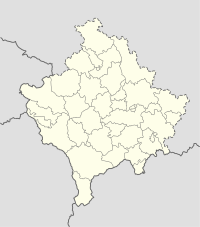Dulje
|
Dulje Дуље |
|
|---|---|
| Settlement | |
| Coordinates: 42°24′33″N 20°52′22″E / 42.40917°N 20.87278°ECoordinates: 42°24′33″N 20°52′22″E / 42.40917°N 20.87278°E | |
| Country | Kosovo |
| District | Prizren |
| Municipality | Suva Reka |
| First mention | 1348 |
| Area | |
| • Total | 54.6 sq mi (141.3 km2) |
| Elevation | 2,106 ft (642 m) |
| Population (1991) | |
| • Total | 1,399 |
| Time zone | CET (UTC+1) |
| • Summer (DST) | CEST (UTC+2) |
| Area code(s) | +381 290 |
| Car plates | 04 |
Dulje (Serbian Cyrillic: Дуље, Albanian: Duhël/Duhla) is a settlement in the Suva Reka municipality in the disputed region of Kosovo. The village is exclusively ethnic Albanian; in the 1991 census, it had 1399 inhabitants.
The village lies in Prizrenski Podgor, about 25 km east of Prizren, on the west side of the Crnoljeva and offset of the Šar Mountains. It lies in the region of Podrimlje. From its heights, one can view almost the whole of Metohija. Dulje extends over a lake terrace, nearly 1 km wide, around 750 m high, which in this part represents the border of the Metohija-Prizren region. The rural settlement lies on a cadastral area of 1413 hectares. Dulje includes two major physiognomic parts: Dulje, the main part with three mahala (hamlets); Rafš, Srpska (Mahallae Shkijeve) and Sopska; the second part is Dragačin, an isolated hamlet on the right valley side of the Dragačin river. The Suva Reka-Dulje-Mališevo road goes through the village.
Dulje was formerly a seat of a municipality with the same name, though it still represents an administrative and cultural center for the neighbouring villages.
The village is mentioned for the first time in the Saint Archangels charter (Svetoarhanđelska povelja) of Emperor Stephen Uroš IV Dušan, dating to 1348, as Duhlje. A medieval road crossed Dulje, from Prizren to Štimlje, further to the interior of Serbia. There are ruins of the medieval Serbian Orthodox Churches of Parascheva (Sv. Petka), on a graveyard, and the Holy Salvation (Sv. Spasa), by the spring of the Lukara stream, in the village.
In 1881, when Dervish-Pasha crushed the rebel Albanians in Ferizovići (Uroševac), he hung Albanian Sejf-Košar to a pear tree between Ferizovići and Štimlje. Some of the Albanians sought rest in Dulje Hana, after their defeat. When the innkeeper burnt trees in the furnace, the Albanians woke up in fear; they thought Dervish-Pasha had come after them shooting guns, after which they fled.
...
Wikipedia

